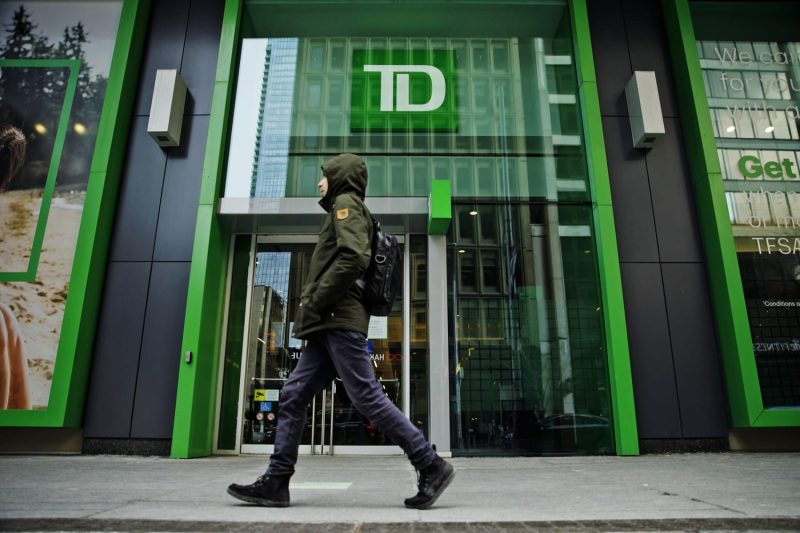October 14, 2024
TD Bank Busted: Hit with $3 Billion in Penalties for Money Laundering Charges!
 TD Bank Pleads Guilty in Money Laundering Case, Will Pay $3 Billion in Penalties
The recent announcement of TD Bank pleading guilty in a high-profile money laundering case has sent shockwaves through the financial industry. The bank has agreed to pay a hefty $3 billion in penalties, marking one of the largest settlements in recent memory. This development serves as a stark reminder of the serious consequences financial institutions face when found engaging in illegal activities.
The case against TD Bank stemmed from a lengthy investigation by regulatory authorities, uncovering a pattern of suspicious transactions indicative of money laundering activities. The bank was accused of failing to adequately monitor and report these transactions, allowing illicit funds to flow through its systems undetected. Such lapses not only violate regulatory requirements but also pose significant risks to the integrity of the financial system.
In response to the charges brought against it, TD Bank opted to cooperate with authorities and admit to its wrongdoing. By pleading guilty, the bank has taken responsibility for its actions and demonstrated a commitment to rectifying the situation. The $3 billion penalty, while substantial, reflects the severity of the violations committed and aims to deter similar behavior in the future.
The repercussions of this case extend beyond the financial realm, underscoring the broader implications of money laundering on society. By facilitating the movement of illicit funds, banks inadvertently enable criminal activities such as drug trafficking, terrorism, and corruption. The ability of financial institutions to detect and prevent money laundering is crucial in safeguarding the global financial system and upholding the rule of law.
Moving forward, it is imperative for banks to strengthen their compliance and anti-money laundering measures to prevent a recurrence of such incidents. Enhancing due diligence processes, implementing robust monitoring systems, and fostering a culture of ethical conduct are essential steps in safeguarding against illicit financial activities. By prioritizing integrity and compliance, banks can not only protect their own reputation but also contribute to a more secure and transparent financial ecosystem.
The case of TD Bank serves as a cautionary tale for financial institutions worldwide, highlighting the far-reaching consequences of failing to uphold anti-money laundering regulations. As the regulatory landscape continues to evolve, banks must remain vigilant and proactive in addressing potential risks to maintain the trust and confidence of their customers and stakeholders. Only through a collective commitment to transparency and accountability can the financial industry safeguard against the scourge of money laundering and uphold the principles of integrity and trust.
TD Bank Pleads Guilty in Money Laundering Case, Will Pay $3 Billion in Penalties
The recent announcement of TD Bank pleading guilty in a high-profile money laundering case has sent shockwaves through the financial industry. The bank has agreed to pay a hefty $3 billion in penalties, marking one of the largest settlements in recent memory. This development serves as a stark reminder of the serious consequences financial institutions face when found engaging in illegal activities.
The case against TD Bank stemmed from a lengthy investigation by regulatory authorities, uncovering a pattern of suspicious transactions indicative of money laundering activities. The bank was accused of failing to adequately monitor and report these transactions, allowing illicit funds to flow through its systems undetected. Such lapses not only violate regulatory requirements but also pose significant risks to the integrity of the financial system.
In response to the charges brought against it, TD Bank opted to cooperate with authorities and admit to its wrongdoing. By pleading guilty, the bank has taken responsibility for its actions and demonstrated a commitment to rectifying the situation. The $3 billion penalty, while substantial, reflects the severity of the violations committed and aims to deter similar behavior in the future.
The repercussions of this case extend beyond the financial realm, underscoring the broader implications of money laundering on society. By facilitating the movement of illicit funds, banks inadvertently enable criminal activities such as drug trafficking, terrorism, and corruption. The ability of financial institutions to detect and prevent money laundering is crucial in safeguarding the global financial system and upholding the rule of law.
Moving forward, it is imperative for banks to strengthen their compliance and anti-money laundering measures to prevent a recurrence of such incidents. Enhancing due diligence processes, implementing robust monitoring systems, and fostering a culture of ethical conduct are essential steps in safeguarding against illicit financial activities. By prioritizing integrity and compliance, banks can not only protect their own reputation but also contribute to a more secure and transparent financial ecosystem.
The case of TD Bank serves as a cautionary tale for financial institutions worldwide, highlighting the far-reaching consequences of failing to uphold anti-money laundering regulations. As the regulatory landscape continues to evolve, banks must remain vigilant and proactive in addressing potential risks to maintain the trust and confidence of their customers and stakeholders. Only through a collective commitment to transparency and accountability can the financial industry safeguard against the scourge of money laundering and uphold the principles of integrity and trust.
If you would like to delve into the world of investment topics , go to our partner project Wall Street Wizardry


